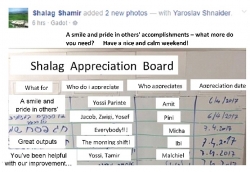There is an old story about an English captain whose time had come to leave his ship. He called his cook, who had served with him for years and said: John, my friend, for many years we have been together at sea and now I am going ashore. I knew there were times I yelled at you for nothing, and I would like to apologize for that.
The cook replied: Captain, there's no need to apologize. Every time you yelled at me, I peed in your soup.
This humorous tale describes the reality of daily life lived by us all, even when it seems to us that we are in an invulnerable position.
This description is certainly true in manager/employee relations, but it also suits every relationship system we engage in with others. These others may be friends, business colleagues, work colleagues, neighbors and even other drivers on the road.
Newton's Third Law also applies to interpersonal relationships
Newton's Third Law states that when two bodies are involved in an interaction of force – the force applied by one body on the other is equal and opposite in direction to the force applied by the second body on the first.
This law, which Newton claimed for bodies found in a reciprocal system of forces, applies also to humans in any type of relationship system.
For example, when we volunteer for a particular activity, we both contribute and benefit from the voluntary activity itself. We become significant individuals for someone else and benefit from much satisfaction.
When a company leads a voluntary project in an employee community, the employees become significant and their loyalty to the company increases.
Or, when we are angry with someone, the anger trickles down into ourselves and, in addition, we obtain a negative reaction from the target of our anger.
The manner in which we lead relationship systems or communicate with our employees does not repudiate the need for discipline, rules or other work procedures.
On the contrary, relationship systems and communication with employees serves organizational discipline, rules and procedures.
In one extreme situation, when a manager inflicts terror in the workplace (and I have seen examples of this), the employees will seek ways to break the discipline in secret.
In another extreme situation, when a manager acts as an educator and teaches instead of giving instructions, he/she will benefit from employee cooperation and the rules will be followed almost automatically.
This method is known as Everyday Coaching.
There are countless situations in between these two extremes.
Should we express appreciation for good performance?
Once I came to a small company whose employee turnover was extremely high. Few employees would stay for more than a few weeks before leaving.
The CEO would shout at his employees for any minor transgression. I asked him why, and he said they needed to learn (usually they learned that it would be best for them to leave).
I asked him if he values and appreciates good work or a good idea. He looked at me in amazement, not understanding what I meant, and said his employees were just doing their job – why compliment or appreciate?
This example is a true one, but extreme all the same; few managers constantly shout at their employees. However, there are also few managers who appreciate their employees through motivational management. The need to increase appreciation for employees is foreign to many managers.
Listen to us.
When we, as managers, are attentive to our employees, we obtain much information from them, as well as their positivity and high motivation.
People often erroneously believe that the only factor that motivates employees is money. That is not the case. Money is not a factor that generates motivation or commitment among employees for their organization (this is almost always true, with minor exceptions).
In my many meetings with employees throughout nearly thirty years of management, the message I hear the most is: "Listen to us".
All of us, as humans, wish to be listened to. When we listen to someone else, like our employees, for example, we are granting them significance. They become more important, and this importance grants them satisfaction and happiness, leading to increased motivation and commitment to the company. If you look inside yourselves, you will see that this is true for yourself as well.
Summary
In any relationship we may have, we receive according to what we give. If we give positive feedback, we will receive it in return. If we shout at our employees, we will obtain hostility. If we listen to our employees, we will be granted important feedback, appreciation and loyalty.
If so, how do we cope with employees who do not contribute, or who are disrespectful? From all those who do, will come those who don't: If we express frequent appreciation for positive actions (verbal recognition in some kind of forum, accompanied by a letter and occasionally enclosed with a dinner voucher, weekend voucher, etc.), the employees who do not receive appreciation will strive to obtain it and will act to even their odds with those who do.
At a large company that has implemented Toyota House's Lean Production Method with great success for years, it is policy to express appreciation for employees at their daily production meetings.
The list of employees who have received appreciation over four days includes: appreciation for providing solutions when needed, appreciation for an initiative to install safety chains, appreciation for assistance in cleaning activities and appreciation for swift product passage.












 My First Book: Manage! Best Value Practices for Effective Management
My First Book: Manage! Best Value Practices for Effective Management